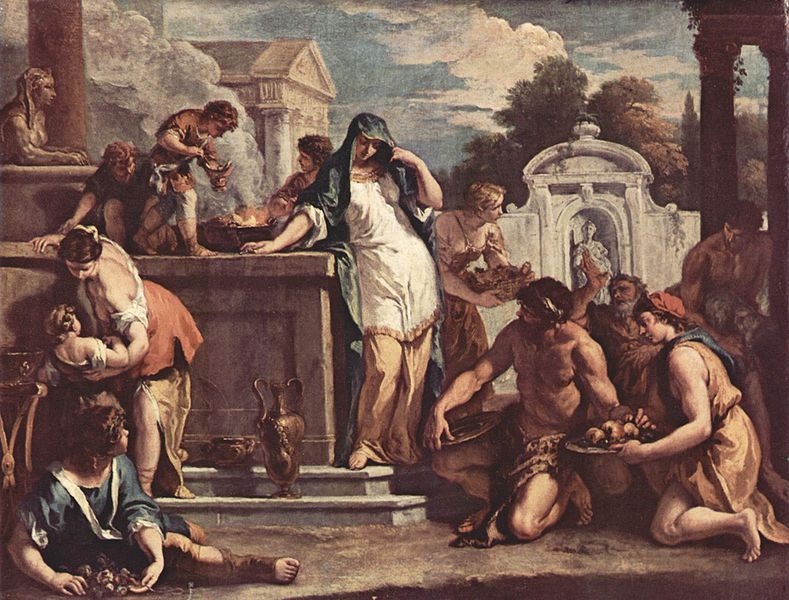HESTIA IN GREEK MYTHOLOGY
Hestia was an important goddess of the Greek pantheon, for Hestia was one of the original Twelve Olympian deities, who resided upon Mount Olympus. Vesta was the Roman equivalent of Hestia.
Hestia Daughter of Cronus
Hestia was a sister of Zeus, for she was one of the 6 children born to Rhea from the seed of Cronus. Hestia was normally named as the first of Cronus’ children to be conceived, followed by Demeter, Hera, Hades, Poseidon and Zeus.
Hestia First Born and Last Born
Cronus was wary of a prophecy that stated one of his children would overthrow him; for Cronus was the supreme god of the cosmos at the time. Thus, as Rhea gave birth to his children, Cronus swallowed them, imprisoning them in his stomach.
Demeter, Hera, Hades and Poseidon would follow Hestia into the stomach of their father, but Zeus did not suffer such a fate, for he was hidden away upon Crete, whilst a stone was substituted in his place.
When of age, Zeus would return from Crete, to lead a rebellion against Cronus and the rule of the Titans; and one of the first acts of Zeus was to release his siblings from their imprisonment. Cronus was thus given a potion which caused him to regurgitate Hestia and her siblings. As Hestia was the first imprisoned, she was the last to be released, giving rise to the belief that Hestia was both the first born, and last born, of the children of Cronus and Rhea.
Demeter, Hera, Hades and Poseidon would follow Hestia into the stomach of their father, but Zeus did not suffer such a fate, for he was hidden away upon Crete, whilst a stone was substituted in his place.
When of age, Zeus would return from Crete, to lead a rebellion against Cronus and the rule of the Titans; and one of the first acts of Zeus was to release his siblings from their imprisonment. Cronus was thus given a potion which caused him to regurgitate Hestia and her siblings. As Hestia was the first imprisoned, she was the last to be released, giving rise to the belief that Hestia was both the first born, and last born, of the children of Cronus and Rhea.
Hestia and the Titanomachy
|
The rebellion of Zeus evolved into the Titanomachy, the ten year war between the allies of Zeus, and the Titans, and whilst Hades and Poseidon fought alongside Zeus, it was commonly said that Hestia, Demeter and Hera, were sent to safety in the realm of Oceanus, where they were looked after by the wife of Oceanus, Tethys.
The Titanomachy eventually ended, as did the rule of Cronus, and a new era of Greek mythology began, with the time of the Olympians. |
|
Hestia Upon Mount Olympus
Mount Olympus had been the headquarters of Zeus during the Titanomachy, and now it became home to him and other deities, for Zeus was now confirmed as the supreme god.
Zeus was joined as an Olympian by Poseidon, Demeter, Hera and Hestia, and these five were followed by Aphrodite, Apollo, Artemis, Athena, Hermes, Hephaestus and Ares.
Each of these twelve Olympians had their own throne in the council room upon Mount Olympus, and unlike the thrones of the other gods and goddesses, the throne of Hestia was made of plain wood and was unadorned.
Zeus was joined as an Olympian by Poseidon, Demeter, Hera and Hestia, and these five were followed by Aphrodite, Apollo, Artemis, Athena, Hermes, Hephaestus and Ares.
Each of these twelve Olympians had their own throne in the council room upon Mount Olympus, and unlike the thrones of the other gods and goddesses, the throne of Hestia was made of plain wood and was unadorned.
Hestia Goddess of the HearthThe name Hestia is normally translated as hearth or fireplace, and this was her role in Greek mythology, for Hestia was the Greek goddess of the Hearth.
Today, this might not seem an important accolade, but in Ancient Greece the hearth was central to family life, settlements and political positions; for the earth provided warmth, was used to cook food, and also used to make sacrifices. Each Greek settlement had its own sacred hearth dedicated to Hestia, and when new colonies were established, fire from the hearth of the first settlement was taken to light the hearth of the new one. Hestia also tended the hearth of Mount Olympus, where the sacrifices of men were used to keep the fires of Mount Olympus burning. Hestia the Virgin GoddessHestia was one of the virgin goddesses of Greek mythology, alongside her nieces, Artemis and Athena, and whilst her beauty attracted the attention of both Poseidon and Apollo, Hestia vowed to remain an eternal virgin, and Zeus thereafter decreed that it would be so.
|
|
Hestia Gives Up her Position
Hestia was considered to be the mildest of the Olympian deities, and whilst most of the Greek gods and goddesses were quick to anger, Hestia was said to avoid confrontation.
To this end is normally said that Hestia gave up her position as one of the Twelve Olympians when Dionysus claimed that by rights he should be one of the twelve, to prevent conflict upon Mount Olympus.
To this end is normally said that Hestia gave up her position as one of the Twelve Olympians when Dionysus claimed that by rights he should be one of the twelve, to prevent conflict upon Mount Olympus.
|
|
Colin Quartermain - 16th February 2018
